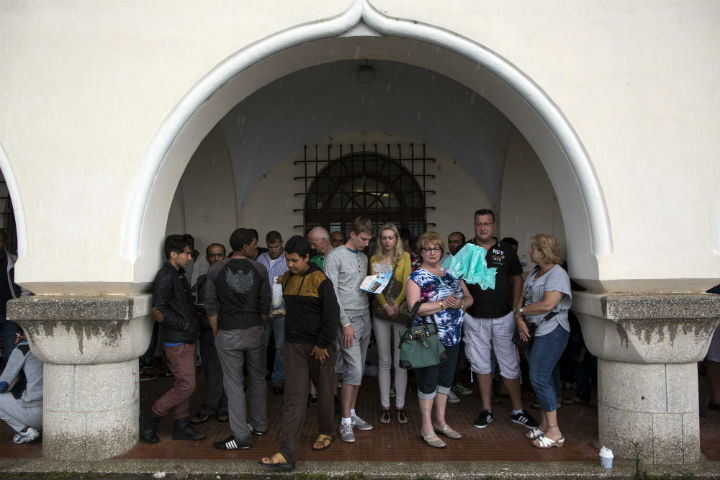Thousands of migrants risk their lives every week by boarding rickety, overloaded boats and dinghies bound for Europe. They’re hoping to find a better life, free from the conflict and poverty in their home countries. They’re also ruining vacations, say British travellers.

“We won’t be coming back if it’s like a refugee camp again next year,” one couple from Birmingham told the Daily Mail in the Greek island resort town of Kos this week.
READ MORE: 40,000 refugees to be relocated across Europe to help Italy, Greece
Another tourist, Anne Servante, said the migrants, most of whom pay all the money they have to human smugglers to get to Europe, had left the island a mess and make it “awkward” for people like her to enjoy an evening out.
“I’m not going to sit in a restaurant with people watching you,” she said. “We have been coming here for almost ten years. We like to eat, drink and relax. But this time the atmosphere has changed.”
And shop owner Caroline Ryderkerk said she understands “it’s terrible for people that have lost their homes,” but their presence on the island is “causing problems” for businesses like hers.
“Some people stay away because they don’t know how to act. It’s normally much busier than this,” she said.
READ MORE: What’s the best way to solve the Mediterranean migrant crisis?
The Daily Mail reported about 1,200 people arrived in Kos, one of the Dodecanese islands, in a two-day period; 6,000 in the past two months.
The island is just four kilometres off the coast of Turkey, which is where the mostly Syrian and Afghan migrants are travelling through to get to Europe.
Overall, more than 60,000 people have tried cross the Mediterranean Sea to European territory so far this year.
The International Organization for Migration said in April the migrant death toll in the Mediterranean is 30 times higher than the first four months of 2014. On Friday, the Italian coast guard rescued about 570 migrants on Friday, finding 11 people dead on board boats.
- Harvey Weinstein hospitalized after return to jail following rape conviction overturn
- California mom accidentally invites 487 people to child’s 1st birthday
- Canada is unblocking aid to Afghanistan but delay is ‘extremely frustrating’: advocate
- ‘Hiroshima-level casualties’ feared in final battle for North Darfur
The situation in the Mediterranean was highlighted by the capsizing of a migrant boat off the coast of Libya last month.
More than 800 people died in that incident alone — the worst such migrant disaster the United Nations has recorded in the Mediterranean. Approximately, 1,800 migrants have died so far in 2015. There were 219,000 migrants who arrived in Europe last year, while 3,500 lives were lost.
READ MORE: Shipwreck rescuer in widely used image honored in Greece
Human Rights Watch lambasted the comments tourists made to the Daily Mail.
“I have just returned from Kos, where I met with asylum seekers who crossed by boat from Turkey to Greece. Let me tell you something about hellholes,” Human Rights Watch senior research assistant Eva Cossé wrote, referencing the Daily Mail‘s headline (below).

Cossé detailed the stories of migrants who had fled Syria in fear of being killed by ISIS or from Afghanistan where they worried their children could be taken from them by the Taliban to be used as suicide bombers.
“Believe me, migrants and asylum seekers want to leave every bit as much as the intolerant British holidaymakers want to see them go.”
She described Kos as no paradise for the migrants.
“There is no reception facility, so police take migrants and asylum seekers to an abandoned hotel with makeshift beds, limited running water, and no electricity. Others sleep in tents provided by Doctors without Borders, while still others are left on the streets.”
The Daily Mail heard some of those stories as well.
Jihad Naif, a dentist from the Syrian city of Raqqa, the de-facto capital of the so-called Islamic State, told the tabloid the of the strict rules the extremist group has imposed and how the militants beheaded one of his cousins.




Comments